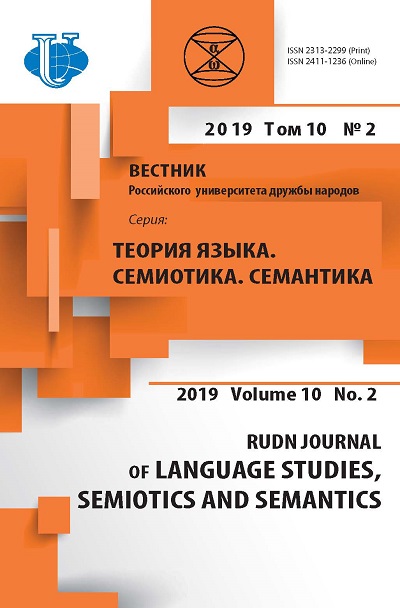ADDRESS FORM AS A REFLECTION OF ETHNO-CULTURAL STYLE OF COMMUNICATION (based on British and Canadian English)
- Authors: Yuryeva Y.B.1
-
Affiliations:
- Peoples’ Friendship University of Russia (RUDN University)
- Issue: Vol 10, No 2 (2019)
- Pages: 532-543
- Section: PRAGMALINGUISTICS
- URL: https://journals.rudn.ru/semiotics-semantics/article/view/21767
- DOI: https://doi.org/10.22363/2313-2299-2019-10-2-532-543
- ID: 21767
Cite item
Full Text
Abstract
Culture and the process of communication are interrelated, since culture not only indicates between which members of the society a communication act is possible, but also helps to decode correctly the meaning of the message that was encoded, and also according to what conditions the message would be correctly interpreted by the interlocutor. The historically established ethno-cultural style of communication (T. Larina) reflects the communicative peculiarities of people’s behavior when choosing verbal and non-verbal means in the process of communication. The article is devoted to sociocultural features that influence the choice of language means for expressing an initial speech formula. The aim of our research is to examine address forms in the boundaries of one language but in two different countries (Canada, Great Britain) with their historical and cultural background. We draw on Cultural Dimensions of G. Hofstede (1991), the Theory of Politeness (Brown & Levinson 1987, Leech 2014), the background of Intercultural Pragmatics (A. Wierzbicka 2003, I. Kecskes 2014), Speech Accommodation Theory (Giles 1977) and etc. The article presents the results of the study on the usage of address forms among the representatives of British English (BrE) and Canadian English (CanE) in order to identify similarities and differences and to explain the results according to cultural characteristics.
About the authors
Yulia B. Yuryeva
Peoples’ Friendship University of Russia (RUDN University)
Author for correspondence.
Email: yuryeva-yub@rudn.ru
PhD student of the Department of Foreign Languages, RUDN University
6, Miklukho-Maklaya Str., Moscow, Russia, 117198References
- Larina, T. (2015). Culture-Specific Communicative Styles as a Framework for Interpreting Linguistic and Cultural Idiosyncrasies. International Review of Pragmatics, 7 (5). Special Issue: Communicative Styles and Genres, 195-215.
- Larina, T. & Suryanarayan, N. (2013). Madam or aunty ji: address forms in the British and Indian languages. In Monika Reif, Justina A. Robinson, Martin Putz (eds.). Variation in Language and Language Use: Linguistic, Socio-Cultural and Cognitive Perspectives. Peter Lang Edition. pp. 190-217.
- Hofstede, G.H. (1991). Cultures and Organizations: Software of the mind. McGraw-Hill Book Company (UK) Limited. London.
- Kecskes, I. (2014). Intercultural pragmatics. OUP USA.
- Brown, P. & Levinson, S. (1987). Politeness: Some Universals in Language Usage. Cambridge: CUP.
- Leech, G. (2014). The pragmatics of politeness. Oxford: Oxford University Press.
- Fitch, K. (1998). Speaking Relationally: Culture, Communication, and Interpersonal Connection. New York: The Guilford Press.
- Clyne, M., Norrby, C. & Warren, J. (2009). Language and Human Relations: Style of Address in Contemporary Language. Cambridge: CUP.
- Kachru, B. (2012). World Englishes: Agony and Ecstasy. Journal of Aesthetic Education, 30 (2), Special Issue: Distinguished Humanities, 135-155.
- Wierzbicka, A. (2003). Cross-cultural pragmatics: The Semantics of Human Interaction. Berlin, New York: Mouton de Gruyter.
- Gudykunst, W. & Ting-Toomey, S. (1990). Culture and Interpersonal communication. Interpersonal communication, 8. Sage Series. Sage Publications.
- Giles, H. (1977). Language, Ethnicity and Intergroup Relations: European Monographs in Social Psychology. London: Academic Press.
- Gladkova, Anna & Larina, Tatiana (2018). Anna Wierzbicka, Language, Culture and Communication. Russian Journal of Linguistics, 22 (4), 717-748. doi: 10.22363/2312-9182-2018-224-717-748.
- Iliadi, P.L. & Larina, T.A. (2017) Refusal Strategies in English and Russian. RUDN Journal of Language Studies, Semiotics and Semantics, 8 (3), 531-542. doi: 10.22363/2313-2299-20178-3-531-542.
- Hall, E. (1990). Understanding Cultural Differences: Germans, French and Americans. Yarmouth, Maine: Intercultural Press.
- Clyne, M. (2009). Address in intercultural communication across languages. Intercultural Pragmatics, 6 (3), 395- 409.
- Crystal, D. (2013). English as a Global Language. Cambridge: Cambridge University Press.
- Schneider, K.P. (2010) Sociopragmatic variation and culture-dependent schemata of linguistic behavior. In 34th International LAUD Symposium. Cognitive Sociolinguistics: Language Variation in its Structural, Conceptual and Cultural Dimensions. Landau / Pfalz (Germany). pp. 245-275.
Supplementary files












